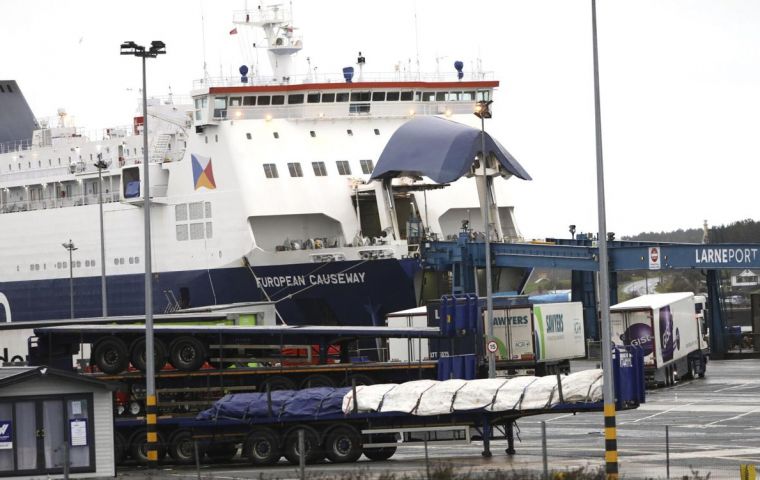MercoPress. South Atlantic News Agency
The Northern Ireland Protocol, fails Unionists' testing
 Officials pulled a dozen staff members from duty at Larne Port after an “upsurge in sinister and menacing behavior,” Mid and East Antrim Borough Council said.
Officials pulled a dozen staff members from duty at Larne Port after an “upsurge in sinister and menacing behavior,” Mid and East Antrim Borough Council said.  This included new graffiti in the Larne area, 32 kilometers northeast of Belfast, that “referenced increasing tensions around the Northern Ireland Protocol”
This included new graffiti in the Larne area, 32 kilometers northeast of Belfast, that “referenced increasing tensions around the Northern Ireland Protocol” The two Northern Irish ports of Larne and Belfast temporarily suspended border checks and withdrew staff on Tuesday amid safety fears. Officials pulled a dozen staff members from duty at Larne Port after an “upsurge in sinister and menacing behavior,” Mid and East Antrim Borough Council said.
This included new graffiti in the Larne area, 32 kilometers northeast of Belfast, that “referenced increasing tensions around the Northern Ireland Protocol”
The council referred to post-Brexit tensions over Northern Ireland and describing port staff as “targets.'' Staff also reported signs of suspicious behavior, including people writing down vehicle license plate numbers.
The relationship between Northern Ireland and the Republic of Ireland was characterized by decades of sectarian violence. Known as the Troubles, it began in the 1960s and lasted until 1998.
But Brexit saw tensions between the two neighbors rise again when Ireland remained in the EU while Northern Ireland exited the bloc along with the rest of the UK. Central to this tension was the issue of the Irish border.
Following Brexit, both sides found it necessary to reimpose checks on goods travelling between the UK and the EU bloc. But there could be no physical, or ”hard“ border set up between Northern Ireland and the Republic of Ireland. The removal of a physical border was viewed a key pillar of the peace process that ended the conflict.
To solve this problem, a new ”regulatory” border was established between Northern Ireland and Great Britain (England, Scotland and Wales).
Pro-British Unionist politicians have spoken out against the move, saying it amounts to a border in the Irish Sea between Northern Ireland and the rest of the UK. Police have warned that violent pro-British Loyalist groups could capitalize on the tensions.
Politicians from all parties in Northern Ireland's power-sharing government slammed the apparent intimidation campaign. In a joint statement, they said: “the Executive is united in condemning any threats made against workers and staff going about their duties at Belfast and Larne ports.”
“There is no place in society for intimidation and threats against anyone going to their place of work,” they said.
A spokesperson for UK Prime Minister Boris Johnson said: ”The safety of staff at our ports ... is our top priority and we are working closely with the PSNI (Northern Irish police service) to better understand the situation.”




Top Comments
Disclaimer & comment rulesCommenting for this story is now closed.
If you have a Facebook account, become a fan and comment on our Facebook Page!